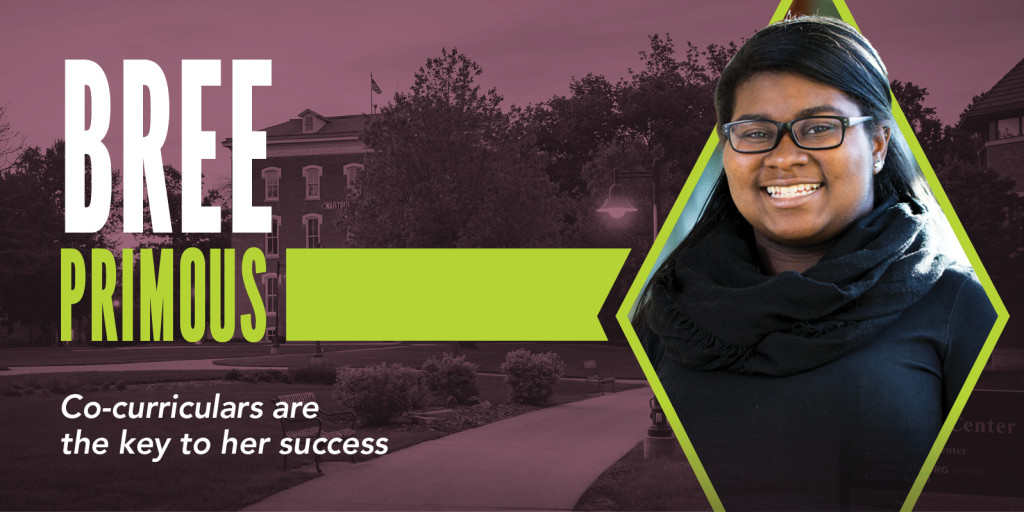Bree: Co-curriculars are the key to her success
January 18, 2019

By Emily Christensen | Photo Julie Pagel Drewes ’90
Bree Primous ’19, a business administration major from St. Louis, did a lot of research before choosing Wartburg College.
In addition to the academics and extra curriculars, she also considered the diversity on campus. Though her graduating class was very small — only 16 — her peers and community were from a variety of ethnic backgrounds. She wanted to be certain the college she chose valued diversity as much as she did.
She knew Wartburg was the right choice after attending summer orientation and meeting several of her future classmates, including a number who looked like her. Yet, even with support from her family, faculty and staff, and classmates, Primous considered leaving Wartburg after her first year.
“I decided to give it another shot, and I’m glad that I did,” said Primous, who spent the first term of her second year at Wartburg West in Denver. “I think it was good for me to be away from campus and to learn more about myself. When I got back to campus, I started as a resident assistant and continued my work with Student Senate. I submerged myself in activities and that really helped me understand why I made the right decision staying at Wartburg.”
At Wartburg, the largest number of American-multicultural students were leaving Wartburg between their second and third year, which is contrary to national statistics that show the greatest drop between the first and second year. When asked during exit interviews, many students said they hadn’t found their niche at Wartburg or that they felt their investment in their education wasn’t valuable because they lacked a sense of purpose in the work they were pursuing.
In an attempt to combat these concerns, the Pathways Center staff has partnered with the Student Life staff and others across campus to implement several programs aimed at better acclimating and retaining American-multicultural students. Those programs have included everything from a career-planning series and mock interviews to extensive career mentoring and employer visits. From 2013 to 2017 the college also offered the Summer Knights Bridge Program, which helped under-represented students with the transition from high school to college. That program went on hiatus in 2018, and the college is determining how it will look in 2019.
“These programs in particular were designed to help students find meaningful experiences that would help them be successful at Wartburg and beyond,” said Derek Solheim, Pathways Center director. “What I like about these efforts and our efforts moving forward is that the work is happening across the campus. Partnerships are key if we are going to be successful. It is everyone’s responsibility to create an environment where students want to persist to graduation.”
When Dr. Dan Kittle became the dean of students and vice president for student life in 2015, he made it clear that he was putting a priority on the retention issues facing the college’s American-multicultural students.
“I am passionate about it because I know it can impact specific students in very powerful ways, and it fits our history as an institution. President (Darrel) Colson talks eloquently to how we were founded to serve German immigrants, people who in some sense were marginalized at that time, and that mission has carried through for more than 150 years. This isn’t a new commitment for us as an institution; it’s part of who we are and our DNA,” Kittle said.
He is hoping a program instituted during the 2017-18 school year will yield some success. During the year, Krystal Madlock, Wartburg’s director of multicultural student services, and Ieshia Brown ’14, then coordinator for academic and multicultural student services, met with every second-year American-multicultural student to learn more about them and the obstacles they might be facing as they look forward in their college career. For some, it was as simple as learning more effective study habits. Others felt unequipped to discern their calling or were unable to find their “home” on campus. Many were worried about how they would continue to pay for their education.
Through these conversations, Madlock said they even found one student with a diagnosed learning disability who had yet to reach out to Nicole Willis, an academic success associate in the Pathways Center. In addition to helping students with their immediate concerns, the goal is to develop an intervention plan to address some of the recurring concerns brought forward during the discussions.
The one-on-one meetings will continue this year with members of the Class of 2021, and Madlock has submitted another proposal to begin the process with next year’s incoming class. Primous appreciates the cross-campus efforts, but said students need to find their passion on campus, because it is those opportunities that will connect them in a tangible way to the college. In addition to being an RA and the student body vice president, Primous helps organize MLK Week, is vice president of Black Student Union, and has served on the Multicultural Diversity Studies Committee.
“I want to be a voice for students of color. I want them to see that it is OK to be involved on campus even if they feel uncomfortable in the beginning,” she said. “And don’t let failure get the best of you. I ran for treasurer in Senate my sophomore year and didn’t get it. I almost quit Senate, but then I found a new way to serve (as the diversity chair). I wouldn’t be in the position I am in today if I hadn’t stuck with it. Everyone should try to get involved because you just never know what kind of opportunities will come from it.”
